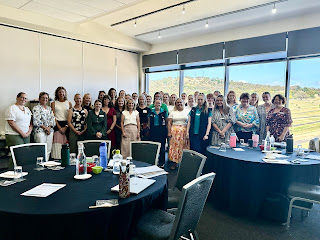Congratulations to Kate Margetson who submitted her PhD today.
Her PhD is titled: "Moving Beyond Monolingual Practices with Multilingual Children: Learning from Vietnamese-English–Speaking Children, Families, and Professionals"
 |
Congratulations Kate!
|
A/Prof Sarah Verdon and I have been very honoured to be Kate's supervisors for her PhD.
Kate started working with us when she joined our VietSpeech (ARC Discovery Grant https://www.csu.edu.au/research/vietspeech/overview) research team as our Project Office. Once the grant finished, Kate re-analysed some of the very rich VietSpeech data to answer new questions for her PhD.
 |
Kate's family and our Speech-Language-Multilingualism team joined to support Kate from across Australia and Ben joined from Viet Nam!
|
Here is Kate's PhD abstract:
Multilingual children’s speech assessment and differential diagnosis of speech sound disorders can be challenging for speech-language pathologists (SLPs), especially if they do not speak the same language as the children they are working with. While best practice recommendations include assessing children in all the languages that they speak, in many English-dominant contexts SLPs often rely on English assessments for diagnostic decision-making. There are few guidelines for how SLPs can assess, transcribe, and analyse speech in children’s home languages. This doctoral research aimed to explore assessment, transcription, speech analysis, and diagnosis of speech sound disorders in multilingual children involving direct speech assessment of children’s home languages. Vietnamese-English–speaking children and their families were the focus of this research.
The thesis contained four parts, which included five publications. Part One, Monolingual Speech-Language Pathologists in Multilingual Contexts (Chapter 1), included an orientation to the thesis, situated the researcher, presented a literature review, and outlined methodology. Linguistic multicompetence (Cook, 2016) and the emergence approach (Davis & Bedore, 2013) were presented as the theoretical frameworks underpinning the research.
Part Two, Vietnamese-English–speaking Children’s Speech described similarities and differences between Vietnamese and English phonology, Vietnamese-English–speaking children’s speech acquisition, and current resources available to SLPs for assessment and intervention with Vietnamese-English–speaking children (Chapter 2). The interaction between Vietnamese and English phonology was explored in a cross-sectional study (n = 149) of Vietnamese-English–speaking children’s and adult family members’ speech in Vietnamese and English (Chapter 3) and found that direction of cross-linguistic transfer in children’s speech was significantly associated with children’s age and language proficiency.
Part Three, Diagnosis of Speech Sound Disorders in Vietnamese-English–speaking Children presented in-depth case studies of Vietnamese-English–speaking children’s speech. Case studies of four children considered the impact of assessing both languages on differential diagnosis (Chapter 4). All four children appeared to have speech sound disorder based on English assessment only, but analysis of children’s speech in both languages revealed that only two children had a speech sound disorder. A longitudinal case study explored four influences on a Vietnamese-English–speaking child’s speech over time (Chapter 5) and found that most speech mismatches could be explained by development, dialect, cross-linguistic transfer, and ambient phonology, and that cross-linguistic transfer reduced over time.
Part Four, Moving Beyond Monolingual Speech-Language Pathology Practices with Multilingual Children presented an evidence-based research protocol, the VietSpeech Multilingual Transcription Protocol, for assessing and transcribing multilingual children’s and adults’ speech, that ensured consistent and reliable transcription (Chapter 6). A clinical protocol, the Speech Assessment of Children’s Home Languages, was proposed, for SLPs to assess, transcribe, and analyse multilingual children’s speech, to account for the idiolects of children, their families, and their SLPs (Chapter 7). The Speech Assessment of Children’s Home Languages will enable SLPs to collaborate with family members and interpreters to assess speech in children’s home languages, providing opportunities to consider children’s entire phonological repertoires during diagnostic decision-making. Finally, conclusions, contributions of the doctoral research, limitations, and future directions were presented (Chapter 8).
This doctoral research sought to bridge a gap between research and practice in multilingual children’s speech assessment by demonstrating the importance of speech assessment of home languages, describing ways of analysing multilingual children’s speech to identify four potential mismatches (development, dialect, cross-linguistic transfer, ambient phonology), and outlining how SLPs move beyond monolingual practices in the way they assess, transcribe, and analyse multilingual children’s speech using the VietSpeech Multilingual Transcription Protocol and the Speech Assessment of Children’s Home Languages.

Congratulations Kate on your important work - and the huge impact that it is already having on professional practice. We are excited that you will continue working with us to translate this work for rural speech pathology practice during your postdoc.
Here are Kate's PhD publications to date (more to come):
-
Margetson, K., McLeod, S., Verdon, S., Tran, V. H., & Phạm, B. (in press). English + Vietnamese speech development. In S. McLeod (Ed.), The Oxford handbook of speech development in languages of the world. Oxford University Press.
- Margetson, K., McLeod, S., Verdon, S. (in press). Diagnosing speech sound disorder in bilingual Vietnamese-English–speaking children: Are English-only assessments sufficient? In E. Babatsouli (Ed.), Multilingual acquisition and learning: An ecosystemic view to diversity. John Benjamins Publishing Company.
-
Margetson, K., McLeod, S., & Verdon, S. (2023). Cross-linguistic transfer and ambient phonology: Impact on diagnosis of speech sound disorders in a longitudinal bilingual case study. Journal of Monolingual and Bilingual Speech, 4(3), 311-339. https://doi.org/10.1558/jmbs.23672
- Margetson, K., McLeod, S., Verdon, S. & Tran, V. H. (2023). Transcribing multilingual children’s and adults’ speech. Clinical Linguistics and Phonetics, 37 (4-6), 415-435. https://doi.org/10.1080/02699206.2022.2051073



















.JPG)

















